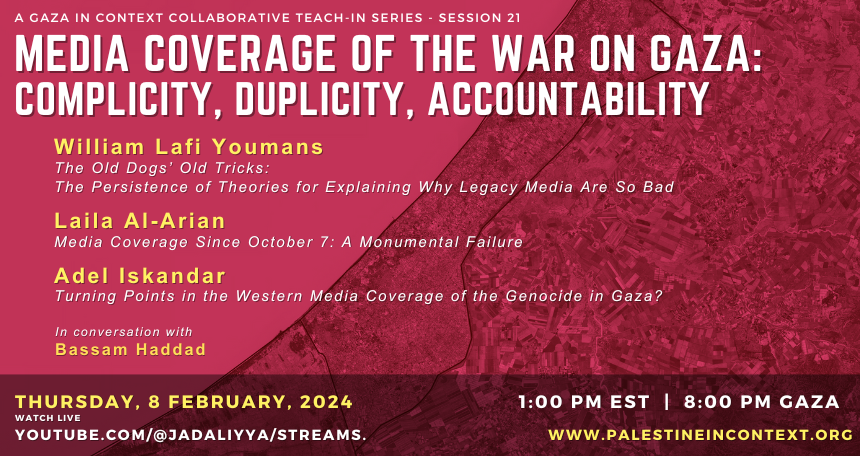| Teach-In Session 21
In four months we’ve witnessed several media narratives from a “War on Terror” discourse to one that abets genocide. This teach-in will address various aspects of the mainstream media coverage of the War on Gaza in the “West,” including traditional and new media. Our speakers will reflect on the performance of media as they navigate pressures from parent companies, editorial policies, political allegiances, and popular dissent. They will also analyze how the influential Sunday news TV shows in the United States discussed Israel’s campaign against Hamas in Gaza.
Gaza in Context Collaborative Teach-In Series
We are together experiencing a catastrophic unfolding of history as Gaza endures a massive invasion of genocidal proportions. This accompanies an incessant bombardment of a population increasingly bereft of the necessities of living in response to the Hamas attack in Israel on October 7. The context within which this takes place includes a well-coordinated campaign of misinformation and the unearthing of a multitude of essentialist and reductionist discursive tropes that dehumanize Palestinians as the culprits, despite a context of structural subjugation and Apartheid, now a matter of consensus in the human rights movement.
The co-organizers below are convening weekly teach-ins and conversations on a host of issues that introduce our common university communities, educators, researchers, and students to the history and present of Gaza, in context.
Co-organizers: Arab Studies Institute, Georgetown University’s Center for Contemporary Arab Studies, George Mason University’s Middle East and Islamic Studies Program, Rutgers Center for Middle Eastern Studies, Birzeit University Museum, Harvard’s Center for Middle Eastern Studies, Brown University’s Center for Middle East Studies, University of Chicago’s Center for Contemporary Theory, Brown University’s New Directions in Palestinian Studies, Georgetown University’s Center for Muslim-Christian Understanding, Simon Fraser University’s Centre for Comparative Muslim Studies, Georgetown University-Qatar, American University in Cairo’s Alternative Policy Studies, Middle East Studies’ Global Academy, University of Chicago’s Center for Middle Eastern Studies, CUNY’s Middle East and Middle Eastern American Center, George Mason University’s Center for Global Islamic Studies, University of Illinois Ghicago’s Arab American Cultural Center, George Washington University’s Institute for Middle East Studies
|














